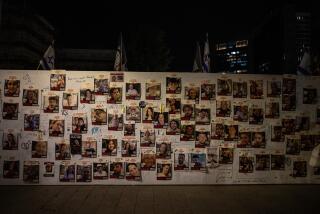West Ponders Milosevic’s Motives
- Share via
WASHINGTON — If the ethnic Albanians who met their violent deaths in the small Kosovo town of Racak were indeed victims of a massacre ordered by Serbian security forces, the atrocity raises new questions about the methods and motives of Yugoslav leader Slobodan Milosevic.
Some American and West European analysts argue that Milosevic, like Iraqi dictator Saddam Hussein, needs periodic confrontations with the West to keep his people convinced that only he can deal with the dangerous outside world aligned against his nation.
A NATO official in Brussels speculated that Milosevic may have watched tensions grow in the U.S.-led coalition after last month’s air campaign against Iraq. He may have bet that similar strains would emerge over Kosovo if Western countries were provoked and forced to consider tough options.
The official suggested that Milosevic also may have been willing to wager that the United States is too distracted by President Clinton’s impeachment trial to bring traditionally more reluctant European allies together for a swift response.
Others who know the region and Milosevic well, however, cautioned against applying normal logic to the Yugoslav president’s motives.
“They are looking at him rationally, in their own terms,” noted one former State Department official who declined to be identified. “His goal is simple: Stay in power. And he does that by keeping the pot bubbling.”
Ljubica Markovic, editor in chief of the independent Beta News Agency in the Serbian and Yugoslav capital, Belgrade, agreed: “He’s done things before that were on the edge of craziness because he thinks it will save him for a few more weeks. This is only a continuation of the same politics Belgrade has been applying in the last several years.”
If Milosevic’s goal is, in fact, merely to stay in power, he has been amazingly successful.
“We’ve had a 10-year succession of Western officials claiming this guy is a bad strategist, but he’s the longest-serving [nonroyal] leader in Europe,” said John Fox, director of the Washington office of the Open Society Institute, a nongovernmental organization actively involved in the Balkans. “Since [former German Chancellor] Helmut Kohl stepped down, Milosevic is the dean of European leaders.”
He has survived in part by inventing a series of enemies for the Serbian people, keeping Belgrade isolated and himself in power since the end of the Cold War.
Some analysts believe the latest atrocities in Kosovo should be viewed through a domestic Serbian prism: They may be aimed at stoking a national crisis to diminish challenges to Milosevic’s authority by political opponents inside Serbia or in Montenegro, now the only other republic in Yugoslavia. As president of Yugoslavia, Milosevic wields power over both states.
Relations between Milosevic and Montenegrin President Milo Djukanovic have steadily soured in recent months as Djukanovic has embraced Western-style reforms. Montenegro reportedly has begun erecting its own customs posts, refusing to repatriate tax revenues to Belgrade, and has even talked about authorizing direct flights to New York by Montenegro Airlines.
“Instead of going after Montenegro as many feared, he’s made a clear decision to move in Kosovo,” said a former U.S. government official now working in the region. “It was the vehicle for his rise to power, and he’s playing that card again.”
Others argued that Milosevic may fear the increasing threat posed by radical Serbian nationalists more than he does North Atlantic Treaty Organization air power, which so far has looked to many like a bluff.
The Oct. 12 cease-fire deal negotiated between Milosevic and U.S. envoy Richard Holbrooke wasn’t signed by the guerrilla forces known as the Kosovo Liberation Army. The KLA quickly took territory as Serbian forces withdrew, and has continued waging attacks on police and alleged collaborators.
As many Serbs see it, Milosevic is losing Kosovo, which their history books teach them is the crucible of Serbian culture itself. From that perspective, Kosovo is one war Milosevic cannot afford to lose.
The international fury provoked by Friday’s slayings also may serve Milosevic’s domestic political purposes by feeding the Serbs’ siege mentality.
The barrage of propaganda and fiercely nationalistic speeches broadcast on state-run television and radio Sunday reinforced a common view among Serbs that the West is conspiring to destroy them.
Analysts also believe Milosevic may hope to use the crisis to drive a wedge between the U.S. and its major Atlantic allies, some of whom have shown reluctance to take strong measures against the Serbs.
In Washington, however, one senior official insisted that the latest round of violence will backfire on the Yugoslav leader.
“This kind of atrocity is a major miscalculation, even by his own twisted logic,” the official said. “Unfortunately, it is just such an atrocity that focuses the mind of European partners.”
*
Marshall reported from Washington and Watson from Pristina, Yugoslavia.
More to Read
Sign up for Essential California
The most important California stories and recommendations in your inbox every morning.
You may occasionally receive promotional content from the Los Angeles Times.













